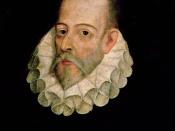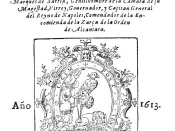Cervantes says via his "friend" /alter ego in the prologue to Don Quijote I, that a writer must not "predicar a ninguno, mezclando lo humano con lo divino ." To what extent does the text of El celoso extremeno respect this dictum? GARRETH HAYE 00007499 Dr. Lal Narinesingh 19th March, 2002 "Ni tiene para que predicar a ninguno, mezclando lo humano con lo divino, que es un género de mezcla de quien no se ha de vestir ningún cristiano entendimiento." (Miguel de Cervantes, Don Quijote, Part 1, pp. 84, 2000) The question of lo divino vs lo humano is perhaps one that acutely affected Cervantes than it did (and continues to affect) the reader. This is so because for Cervantes, the issues raised by this question (lo divino vs lo humano) were of great importance to the Cervantine novel and they all converged on one focal point: the purpose and responsibilities of literature.
The obligation to produce good art was a responsibility which was faced squarely by Cervantes. The seriousness of this obligation is evident in the claims and propositions he makes in the prologues of his works. In the prologue to Don Quijote, his direct articulation that the primary purpose of literature is not to propagate dogma of any kind whether religious or otherwise directly opposed the seventeenth-century Spanish practice that literature must be put to the service of judaico-moral indoctrination. It is Cervantes' alternative approach to literature that brings us to discuss the place of lo divino and lo humano in Cervantine literature.
Cervantes claims that the reader will be able to "sacar algún ejemplo provechoso" from these stories; after all, they are novelas ejemplares. However, in the same prologue he suggests that "if the reader is interested in moral indoctrination, he would be better of in church" (Narinesingh transcript 4). These two statements to the uncritical observer may seem contradictory but really are not. Cervantes has separated the act of preaching form the act of moralizing, asking us to follow suit and distinguish between ill conceived dogma and the literature's role to inform. Essentially, Cervantes has rejected the doctrinaire purposes of literature replacing it with "verdades que dichas por senas". So while the author's task is not to preach good literature must present a better vision of the world, contributing to man's knowledge of himself while stimulating independent thought.
So, while recognizing the characteristics of good literature, Cervantes presents them to us through the use of ejemplos provechos and verdades que dichas por senas. The things which matter to literature are fundamental human truths (Narinesingh 1990, 4) that contribute to man's knowledge of himself and examples that motivate the reader to think critically of human nature and the human situation. It includes a presentation of human problems and identifies proposals.
It is difficult to offer a formula that contains the whole meaning of the work, inclusive of authorial intent and its messages; however, Cervantes does offer some assistance. Firstly, Cervantes has placed the intention of his work in the prologue which invites us to shed our morally judgmental attitudes adopting instead an attitude that welcomes intellectual and aesthetic fulfillment. Secondly, he does not preach to his audience as we expect him not to. Instead he moralizes on the social mores of his time. In the text the human and social values transcend purely religious ones. This is evident at the end of the novella where Carrizales' discussion of faith, love, goodness and freewill appears to reveal the moral exemplarity of El Celoso Extremeno (Davis 641). He (Cervantes) skillfully presents a lesson of self-realization negotiated in the public system of values. As Davis states in her paper, "Marriage and Investment in El Celoso Extremeno": "Although other literary treatments of real or perceived adultery and the honour theme lead us to anticipate Carrizales' cleansing of his dishonour with the blood of the offenders, Cervantes has the old man opt for a novel resolution of the dilemma. He acknowledges of his own fault in establishing the confining marriage. Next he revises his will so that all he has invested in the marriage will not be wastedâ¦" (Davis 640) Carrizales' actions were quite unexpected. Possibly Cervantes is suggesting that there will arise moments in our lives where we will transcend ourselves, exercising some extra-ordinary power with which we have all been endowed. As such I contend that Cervantes' intentions were morally didactic. The reader is expected to learn from the characters' actions. Whether we laugh or cry at the end of the story we are invited to think.
To a great extent Cervantes decision to allow Loaysa to run of to the Indies implies that one day he (Loaysa) will become a Carrizales, as Carrizales had once been a Loaysa. This cyclical nature of human behaviour suggests a kind of fatality in human action/decision and not only has implications for Loaysa's future but also for those who try to control and dominate the lives of others. Man may be subjugated to physical dominance by another, however, no amount of precautions and measures (like Carrizales' house) can keep him spiritually and morally bound. This reality comes forcefully to Carrizales at the end of the story where he rebukes himself for his failed efforts to control Leonora: ⦠mas como no se puede prevenir con diligencia humana el castigo que la voluntad divina quire dar a los que en ella no ponen del todo en todo, sus deseos y esperanzas ⦠(Cervantes 1990, 292) The insistence that a distinction be drawn between the act of moralizing and the act of preaching provides the only framework in which Cervantes' respect for the dictum (as presented in the question) can be appropriately explored. The text no doubt has to be examined also within the context of seventeenth-century Spanish Christian society because the Catholic Church was considered the bastion of correct moral teachings. However, the text rejects to hide behind a cloak of Christian doctrine and to a great extent Cervantes has used his literature as a vehicle to present his alternate view of humanity and morality. What makes his message different however, is his approach to literature. With all that he has presented it is "certainly correct to read El Celoso Extremeno as affirming the individual's right to freedom, and his responsibility to exercise his liberty and respect that for others (Lambert 225)." El Celoso Extremeno tells of a man who did not respect the freedom of others, who brought about his own downfall by attempting to impose his scheme upon the world. By demonstrating that one sequence of events can legitimately evoke contradictory responses the story warns us to beware of imposing schemes which attempt to deny the freedom of people to be complex and unpredictable, whether in reality or fiction (Lambert 230).
Work Cited Davis, Maria Cox., 'Marriage and Investment in El Celoso Extremeno", Romanic Review, 86 No. 4 (November 1995) pp. 639-655.
Lambert, A.F., "The two versions of Cervantes' El celoso extremeno: ideology and Criticism", Bulletin of Hispanic studies, 57 (1980) pp. 219-231.
Miguel de Cervantes "El Celoso Extremeno" in Las Novellas Ejemplares ed. Fernando GutÃÂerrez, Barcelona: 1990.
Miguel de CervantesDon Quijote de la Mancha, Part 1, ed. John Jay Allen, Madrid, 2000.
Narinesingh, Dr. Lal, The prologues of siglo de oro prose fiction: some aesthetic and perennial implications, Presented to the Twelfth Annual Caribbean Conference of Hispanists at the University of the West Indies, St. Augustine, Trinidad and Tobago, (April 1990) _________. Course Transcripts, Las Novelas Ejemplares. 2000



